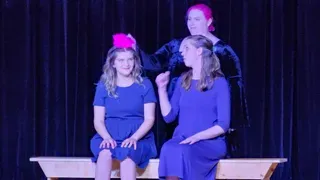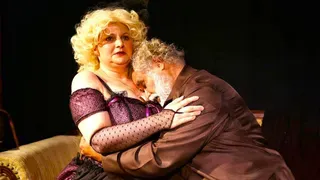June 5, 2015
Testament of Youth
Kilian Melloy READ TIME: 3 MIN.
"Testament of Youth", the memoir of English pacifist Vera Brittain, has remained a best seller across the decades since its publication; it's also led to a 1979 television mini-series and, now, a movie version in which meteorically-rising star Alicia Vikander takes the role of Brittain. Truthfully, Vikander is the best thing about it.
Hers is a layered performance that recalls the brittle iciness of Michelle Dockery's Lady Mary on "Downton Abbey," but which also thaws periodically into episodes of simmering (but ever so genteel) rage. Playing opposite Vikander as a trio of young actors: Colin Morgan as Victor, a would-be suitor; Taron Egerton, who plays Edward, Vera's younger brother; and Kit Harington, who takes the part of Roland, the man who succeeds at wooing Vera.
It's their bad luck that just as they are coming into their own, World War I breaks out and derails all of their young lives. Vera -- who is headstrong to a fault, but unmissable brilliant -- has won herself a place at Oxford University, but she feels unable to stay on in academia while the boys are all signing up for military service. When she volunteers as a nurse, she finds that the others on the hospital staff relish the opportunity to needle and reprimand someone of her social class -- but, as she writes in a letter, she welcomes hardships as a way of keeping her mind off her worries.
The youthful performers are supported by a ring of splendid, more mature figures, including Dominic West as Vera's father; Emily Watson as her mother; Miranda Richardson as one of her instructors at Oxford; and Anna Chancellor as Roland's novelist mother. (The latter two are clearly role models for the fiery Vera, who isn't at all content to stick to a woman's traditional role in Edwardian England.)
This film is handsomely produced and beautifully shot by cinematographer Rob Hardy. It's also hobbled by a certain rote quality that pervades every scene, as well as an emotionally heavy, damp atmosphere. The editing, by Lucia Zucchetti, is lively, and re-creates the experience of how memory of things past informs the present moment; in many instances, it's a recollection of Roland that sustains Vera as she works exhausting hours in trying conditions. Director James Kent succeeds at creating a mood in which the past is recalled both with substance and nostalgia; there's a golden glow about many scenes, but there's also a solidity to the film's production design and visual aesthetic.
If only "Testament of Youth" weren't so lachrymose. This is a romance with a bayonet, rather than a rose, between its teeth; a war drama chick flick that strains for dramatic urgency; and, finally, a plea for reason and peaceful co-existence over the wild aggressions of male-dominated nation-states. When, near the film's end, Vera addresses a bloodthirsty crowd and warns that the "cycle of revenge" will only continue unless Britain and other nations are willing to hold out a helping hand to defeated Germany, it's hard not to feel that the film is deflating before our very eyes. History is what it is; we know how the nations of the world treated Germany after World War I, and how it prepared the ground for horrors to come.
The future is the part of the story books that remains unwritten, of course, and the Brittain's essential message is as worth hearing now as it was in 1918. But it's also just as likely that her sentiments will be as throughly ignored in years to come as they have been in the near-century since the first Great War ended.
Kilian Melloy serves as EDGE Media Network's Associate Arts Editor and Staff Contributor. His professional memberships include the National Lesbian & Gay Journalists Association, the Boston Online Film Critics Association, The Gay and Lesbian Entertainment Critics Association, and the Boston Theater Critics Association's Elliot Norton Awards Committee.







